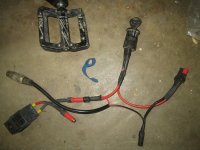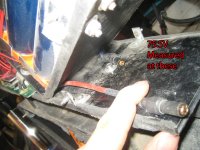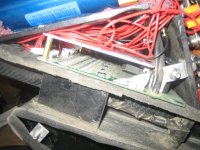Kyle201
10 W
Hello folks.
So I come today with a problem. I built my first ebike several months ago, and have done almost 3000km on it so far without major issue, until it just died this week. The controller won't power on.
Some specs:
- Headway 15AH 24S battery
- 24S Headway BMS / PCM http://www.headway-headquarters.com/xji-24s-72v-50a-100a-pcm-special-order-only/
- Grinfineon 40A, 12 Fet Controller with on/off switch - Shunt modded to 62A
- Cycle Analyst V3
- Hardtail MTB frame, and I frequently go off-road.
- 50A littelfuse
- Key switch accessory
When it Happened:
After about 40km of very easy riding I went to go climb a short and slightly steep trail section, just a little bit rough and rooty. The bike bounced around a little as I started to go up and then barely before I even reached full power everything shut off, and the controller wouldn't start up anymore and still won't. Nothing was hot just barely warm.
Sometimes it will start up now with 2 light flashes, and the CA will almost show text for a split second. But usually only 1 red light on the controller flash, and just the CA backlight for a split second before it just shuts itself off again.
I inspected most of my wiring, at a glance nothing seems unusual, of course I will continue to look for something wrong in the wiring.
Some tests I did:
Mosfet test as illustrated on ebikes.ca
- Negative to all phases tested good
-Positive to phases tested strangely, giving me a high value (at MM set to 200K ohms) and this reading would slowly start to drop 0.1 per second or so. Not sure what that means.
Hooked up my 30v variable power supply to the controller, and it seemed to power on fine, CA powered on fine.
Tested battery voltages
- ~79V coming from the cell ends
- ~75V coming from the end of my wire harness at the bullet connectors that go to the controller
So what should I test or look for next? Just keep looking for a bad terminal or wire somewhere? Is it possible for a BMS sense wire to be broken if I'm still getting voltage like that at the end of my harness?
Any and all help appreciated.
So I come today with a problem. I built my first ebike several months ago, and have done almost 3000km on it so far without major issue, until it just died this week. The controller won't power on.
Some specs:
- Headway 15AH 24S battery
- 24S Headway BMS / PCM http://www.headway-headquarters.com/xji-24s-72v-50a-100a-pcm-special-order-only/
- Grinfineon 40A, 12 Fet Controller with on/off switch - Shunt modded to 62A
- Cycle Analyst V3
- Hardtail MTB frame, and I frequently go off-road.
- 50A littelfuse
- Key switch accessory
When it Happened:
After about 40km of very easy riding I went to go climb a short and slightly steep trail section, just a little bit rough and rooty. The bike bounced around a little as I started to go up and then barely before I even reached full power everything shut off, and the controller wouldn't start up anymore and still won't. Nothing was hot just barely warm.
Sometimes it will start up now with 2 light flashes, and the CA will almost show text for a split second. But usually only 1 red light on the controller flash, and just the CA backlight for a split second before it just shuts itself off again.
I inspected most of my wiring, at a glance nothing seems unusual, of course I will continue to look for something wrong in the wiring.
Some tests I did:
Mosfet test as illustrated on ebikes.ca
- Negative to all phases tested good
-Positive to phases tested strangely, giving me a high value (at MM set to 200K ohms) and this reading would slowly start to drop 0.1 per second or so. Not sure what that means.
Hooked up my 30v variable power supply to the controller, and it seemed to power on fine, CA powered on fine.
Tested battery voltages
- ~79V coming from the cell ends
- ~75V coming from the end of my wire harness at the bullet connectors that go to the controller
So what should I test or look for next? Just keep looking for a bad terminal or wire somewhere? Is it possible for a BMS sense wire to be broken if I'm still getting voltage like that at the end of my harness?
Any and all help appreciated.




